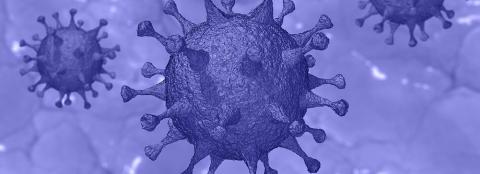
Study reveals links between COVID-19 symptoms in 2020 and suicidal ideation in 2021
An international study involving researchers from McGill University, Montreal, and led by scientists at Université Paris-Saclay, the French National Institute of Health and Medical Research (Inserm) and Université de Versailles Saint-Quentin-en-Yvelines, working in the Centre for Epidemiology and Population Health (CESP - Inserm/Université Paris-Saclay/UVSQ), has published its first findings. Based on data from the French EpiCoV cohort, the study observed a higher risk of subsequent suicidal ideation among individuals recovering from COVID-19 symptoms. The results were published in Plos Medicine on 14 February 2023.
Since the beginning of the COVID-19 pandemic, experts from the suicide research field have warned of a potential major impact on mental health, fearing a higher risk of suicidal ideation among people recovering from COVID-19. Following a lack of longitudinal data on the subject, this study, led by a team at CESP (Inserm/Université Paris-Saclay/UVSQ), aimed to understand if self-reported COVID-19-like symptoms in 2020 were associated with an increased risk of suicidal ideation in 2021, and secondly, if this relationship also existed when using a SARS-CoV-2 biological marker.
The study was carried out using data from a French population-based cohort study, EpiCov*, which has followed the health and living conditions of over 80,000 people since May 2020.
In May and November 2020, cohort participants were asked whether they had experienced potential COVID-19-like symptoms since the start of the pandemic: sudden or unusual loss of taste/smell or fever alongside cough, shortness of breath or chest oppression. In November 2020, participants were also tested for SARS-CoV-2 serology to detect signs of contact with the virus, regardless of if they had experienced symptoms or not. In July 2021, cohort participants were asked whether they had experienced suicidal ideation since December 2020. Numerous sociodemographic and health-related variables were taken into account to obtain an accurate picture of participants’ living conditions.
Of the 52,050 participants involved in the present study, 1.7% reported suicidal ideation between December 2020 and the summer of 2021. Reporting COVID-19-like symptoms in 2020 was associated with a 43% increase in the risk of reporting suicidal ideation in 2021. However, the study did not find an association between serologically confirmed SARS-CoV-2 infections in 2020 and suicidal ideation in 2021.
In other words, while being infected with SARS-CoV-2 did not appear to have an impact on the risk of suicidal ideation, the study showed that experiencing COVID-19-like symptoms was associated with an increased risk of suicidal ideation.
“Serology testing allowed us to explore if being infected with SARS-CoV-2 in 2020 increased the risk of experiencing suicidal thoughts in 2021, but without information regarding the date, type or severity of the infection. While we did not find any such association, our results are not sufficient on their own to disprove the impact of SARS-CoV-2 on suicidal ideation. Additional studies with information regarding the type and severity of the virus are needed. However, our results showed that experiencing COVID-19-like symptoms - a potentially fatal transmissible disease for which no treatment was available, during a time when we had little information about its development and after-effects, probably generated enough stress to increase the risk of subsequent suicidal ideation. It is important to take suicidal ideation seriously, to monitor and understand it so that we can find solutions, or at least prevent ideation from worsening. These results could also prove useful in helping us deal with future pandemics,” explained the study’s authors.
These results encourage the deployment of mental health resources (emergency helplines, the monitoring of symptoms, population frequency, etc.) in places where people experiencing COVID-19 symptoms are likely to go, to encourage them to be mindful of their mental health, limiting the appearance or worsening of suicidal ideation.
* https://www.epicov.fr/
This cohort study is jointly coordinated by the French National Institute of Health and Medical Research (Inserm) and the Directorate for Research, Studies, Assessment and Statistics (DREES) within the French Ministry for Solidarity and Health, with the support of the French National Institute of Statistics and Economic Studies (Insee) and Santé Publique France.
If you are experiencing distress or suicidal thoughts, or if you would like to help someone in distress, go to the International Association for Suicide Prevention website to find a helpline: https://findahelpline.com/i/iasp
